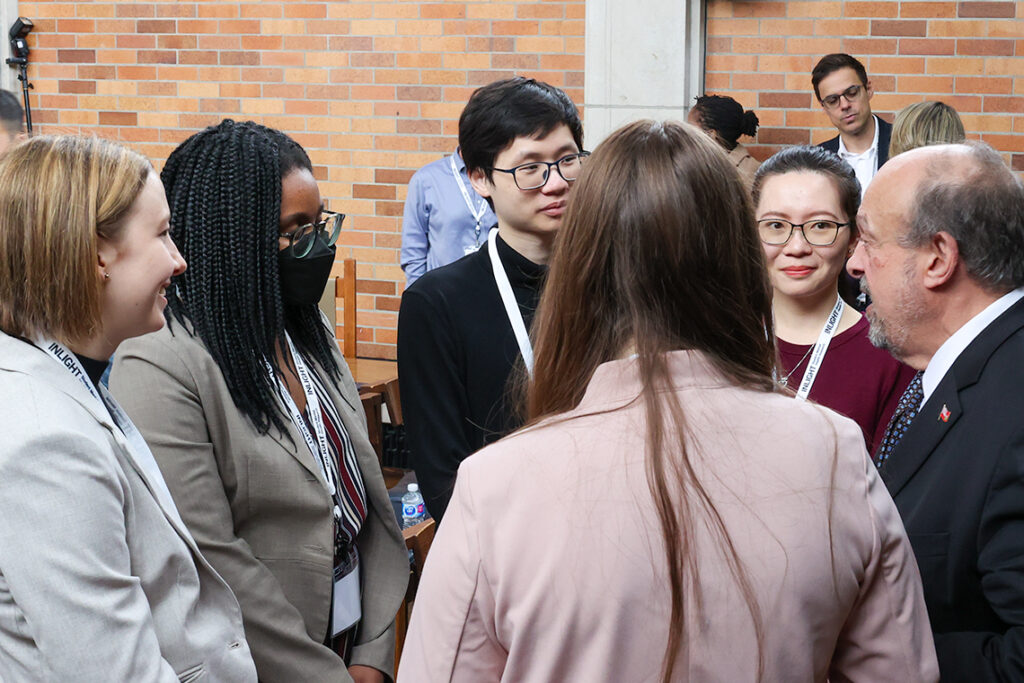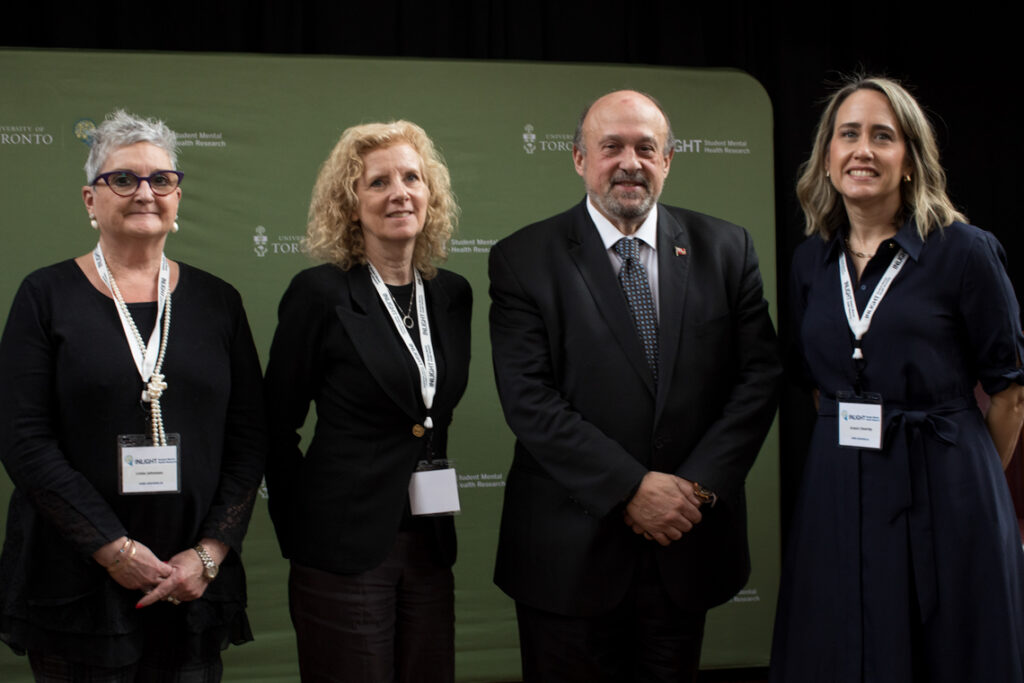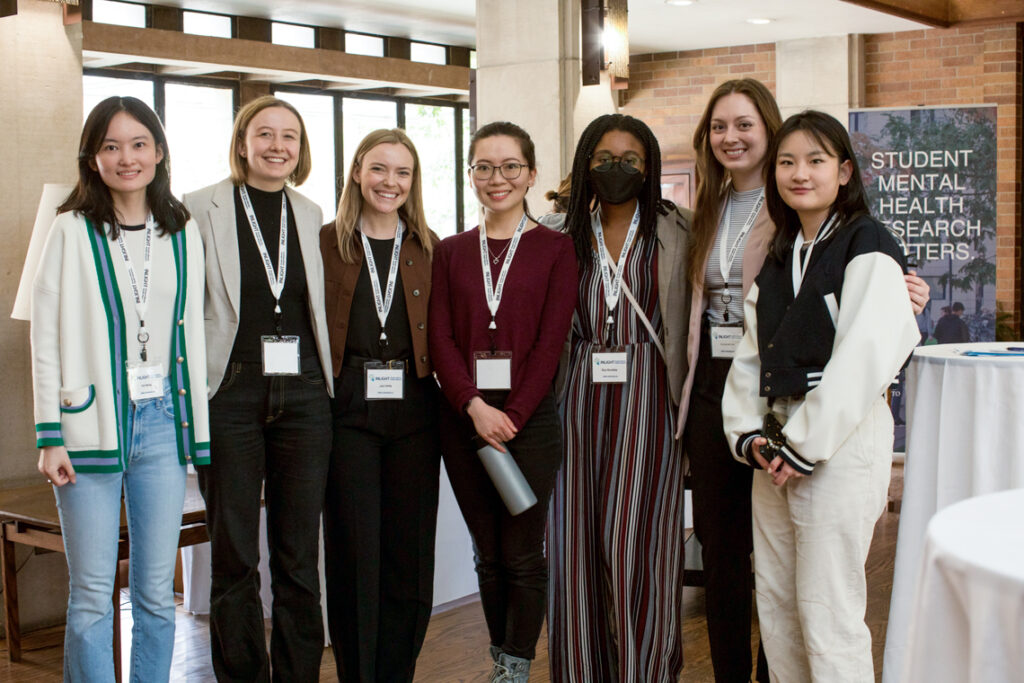In partnership with students, U of T launches strategic initiative to improve mental health outcomes through research

Emma McCann, left, chairs a panel discussion with students Sapolnach Prompiengchai, Rya Buckley, Joanna Roy and Yaxi Zhao during a launch event for Inlight. Photo by Dewey Chang.
The University of Toronto has launched Inlight, an Institutional Strategic Initiative and a featured initiative of the Defy Gravity campaign that aims to improve post-secondary student mental health and wellness by investing in impactful research and driving scalable research innovations.
Inlight recently held a kickoff event at Massey College to mark the start of Mental Health Week. It featured remarks from senior U of T leadership, Inlight researchers and Ontario’s associate minister of mental health and addictions – as well as a panel discussion with students.
“As a world-leading research university, we recognize that we also have this enormous opportunity to develop a new research model and evidence to inform services not just at our university, but across Canada and the world,” Cheryl Regehr, U of T’s vice-president and provost, said at the event.
Inlight funds leading-edge research on youth and student mental health to uncover the evidence and data needed to inform and improve mental health services on university campuses – both at U of T and at universities across Ontario and around the world. The initiative stems from the recommendations of a 2019 report by the Presidential & Provostial Task Force on Student Mental Health.
Michael Tibollo, Ontario’s associate minister of mental health and addictions, noted the disproportionate impact the COVID-19 pandemic had on youth and students.
“The innovative research you are conducting helps form the foundation of the continuum of care we’re building in the province of Ontario,” Tibollo said. “I look forward to seeing the positive changes you bring to the field of student mental health, further enhancing supports for Ontario’s post-secondary students.”

Inlight’s five-year plan was developed in consultation with students, researchers and other U of T community members, leveraging mental health expertise across U of T’s three campuses and with students as collaborators in the research process.
Student engagement is vital, said Inlight Director and Chair Kristin Cleverley, an associate professor in the Lawrence S. Bloomberg Faculty of Nursing and the department of psychiatry in the Temerty Faculty of Medicine.
“Our mission is guided by key principles, including prioritizing the student voice through partnerships. Improving student mental health outcomes requires driving system change through investments in bold research-driven solutions.”

The launch included a panel discussion moderated by Emma McCann, Inlight’s engagement lead, with students Rya Buckley, a master’s student at the Ontario Institute for Studies in Education; Sapolnach Prompiengchai, an undergraduate student in the department of psychology at U of T Scarborough; Joanna Roy, an undergraduate student in the Faculty of Applied Science & Engineering; and Yaxi Zhao, a PhD student in the Faculty of Information.
“Together, we can better understand the determinants of student mental health, enhance our strategies and translate those findings into a student-partner knowledge mobilization initiative that can directly impact our students’ mental health and well-being,” Prompiengchai said.
Prompiengchai and Roy sit on Inlight’s student advisory committee, while Buckley and Zhao are among the seven inaugural recipients of the Inlight Fellowship, an annual funding program created to support exceptional graduate scholars who are leading student mental health research at U of T.

Nine U of T researchers have also received grants from Inlight in support of research that aims to spark advances in post-secondary student mental health and wellness.
Each of the one-year projects include students as co-investigators or collaborators and will address critical areas of mental health for post-secondary students – including the needs of 2SLGBTQ+ students, understanding anti-Black racism and mental health within higher education, the intersection of mental wellness and disability services, and the lingering impact of the COVID-19 pandemic.
“In addition to the student-led research that Inlight is driven to support, we are also proud to be able to provide funding to faculty researchers at U of T, who are actively leading projects that will rapidly build knowledge in areas pertaining to the mental health needs of diverse student populations,” Cleverley said.

